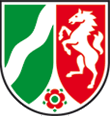North Rhine Westphalia

Capital: Düsseldorf
Website: http://www.nrw.de/
Description
Metropolitan area in the heart of Europe
NRW lies at the center of Europe and borders on the Netherlands and Belgium.
It is the most populous and the most densely populated of the 16 federal states
in Germany. NRW has 30 cities with more than 100,000 inhabitants. The most
important metropolitan areas are the Ruhr region with approx. 5.4 million
inhabitants and the Rhineland with 3.5 million inhabitants.
Purchasing power
Almost 150 million people live within a day's truck journey of the state
capital, D�sseldorf. This represents 1/3 of all consumers and 45 % of the
purchasing power in the EU. The inhabitants of NRW alone spend over EUR 300
billion on private consumption every year.
21 of the 50 largest German companies are based here (e.g. Deutsche Telekom,
Metro, Eon, Deutsche Post, RWE, Bayer, Bertelsmann).
Strongest industrial region in Europe
NRW is Germany's leading chemical location (Lanxes, Degussa, Henkel, and Cognis).
The biggest employer is mechanical engineering with more than 205,000 employees
(ThyssenKrupp, GEA, SMS Demag). NRW is the most important steel location in Europe
(ThyssenKrupp, Benteler, Hydro Aluminium). The state is Europe's no. 1 energy
region: about a third of German electricity is produced and almost 30 % of the
total energy required in Germany is consumed here (RWE, Eon, Ruhrgas, RAG).
Strong industry offers good environment for service providers
70 % of the region's economic output is generated by service providers. 6,2 million
people work in this sector. The industry-related service providers play a
particularly important role.
Large qualified labor potential
NRW has 58 universities and technical colleges with 32,000 scientists and
researchers and over 470,000 students. 6 of the 12 largest universities in Germany
are located here.
R&D location of world renown
63 technology centres and 61 non-university research facilities form the densest
research network in Europe and provide ideal conditions for technology transfer.
High quality of life
Renowned theatres and museums, 4 UNESCO World Heritage Sites. Sports events and
cultural festivals in NRW are known internationally. The Eifel national park is
just one of many popular leisure destinations.
Sources: GfW NRW, LDS NRW, Federal Statistical Office, Eurostat
Key Statistics
Area : 34.085 km²
Total population : 18,058,105 inhabitants
Population age group |
No. of inhabitants |
% |
55 - 59 |
1,053,089 |
5.83 |
60 - 64 |
981,735 |
5.44 |
65 - 69 |
1,155,605 |
6.40 |
70 - 74 |
835,746 |
4.63 |
75 - 79 |
691,607 |
3.83 |
80 - 84 |
475,555 |
2.63 |
85 + |
322,65 |
1.97 |
Total 55 + |
5,548,987 |
30.73 |
Population density : 530 inhabitants per km²
Working population : 8,426,400 people
GDP per inhabitants: 25,982 �
Further statistics on the demographic change in Germany
Contact Information
Homepage: http://www.nrw.de/
Relevant Policy Initiatives
Landesinitiative Seniorenwirtschaft (http://www.seniorenwirt.de)
Partners
-
Ministerium f�r Gesundheit, Emanzipation,
Pflege und Alter des Landes Nordrhein-Westfalen
Ministry of Health, Equalities, Care and Ageing
of North Rhine-Westphalia
http://www.mgepa.nrw.de/ -
NWHT - Nordrhein-Westfälischer Handwerkstag
http://www.nwht.de/ -
LAG FW - Landesarbeitsgemeinschaft der Freien Wohlfahrtspflege
http://www.freiewohlfahrtspflege-nrw.de/ -
IHKV - Vereinigung der Industrie- und Handelskammern in Nordrhein-Westfalen
http://www.ihk-nrw.de/
Click here to get back to the regions map

